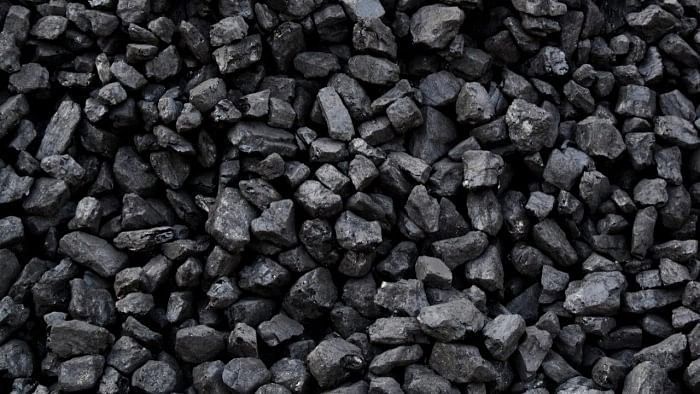
Representative image showing coal.
Credit: iStock photo
Over 100 miles north of London, Britain’s last coal-fired power station, the Ratcliffe-on-Soar plant, will be powered down on October 7, ending Britain’s reliance on coal for power. The plant, outside Nottingham, will cease operations permanently.
It is a remarkable moment for a country that was the first to exploit coal in vast quantities, using it to make steel and glass and kick-starting the Industrial Revolution in the process. Coal turned the machinery in textile factories; it fuelled the locomotives on railways; it replaced wood fireplaces, heating British homes. Most of all, it provided electricity.
Coal-fired power stations like Ratcliffe accounted for more than three-quarters of Britain’s electricity generation as recently as the early 1990s. But in the ensuing years the country has reduced its reliance on coal faster than any other major industrialised nation.
Last year coal provided only 1.3% of Britain’s power, with a little more than a third coming from gas-fired power stations and a little less than a third coming from wind turbines.
Few in Britain — including me — will mourn the passing of coal or the closure of plants such as Ratcliffe. Coal-fired power is the single largest source of global greenhouse gas emissions, responsible for much of the climate crisis that is only growing worse.
Even so, it’s hard not to feel a little nervous about what, at its heart, is an experiment, one fraught with danger. Britain has turned itself into a test case for what happens when you take an industrial economy and rapidly wind down the use of fossil fuels. Already, there are consequences: higher power costs and a shrinking manufacturing base. The health of the country’s economy — and the willingness of other countries to follow — may very well ride on the experiment’s success.
The pressure is on in part because of a highly ambitious deadline set by the new Labour government to achieve a carbon-neutral power system by 2030. Unlike our Scandinavian neighbours, Britain does not have enough hydroelectric dams to provide the bulk of the power we need. Our fleet of nuclear power stations is smaller and older than France’s. Last year the Climate Change Committee, a public body that scrutinises environmental policy, warned that the country wasn’t even on track to hit this goal by 2035, let alone five years earlier.
A precarious transition
Part of the problem is that the infrastructure needed to accommodate a system more reliant on renewable energy sources such as wind and solar hasn’t been completed.
Most of Britain’s high voltage power lines are still connected to big power stations like Ratcliffe, near population centres, rather than the wind turbines offshore in the North Sea. Those living in rural areas in the east of England are resisting attempts to build the necessary power lines across their land that would move clean electricity to the big cities.
The other problem is that the technology isn’t there yet. Various tools needed to provide energy storage to keep the lights on — when the wind isn’t blowing and the sun isn’t shining — are still prototypic and expensive, most notably hydrogen.
Meeting the 2030 deadline will
happen only if another country (most likely China or Saudi Arabia) has a technological breakthrough or if the British government throws a lot of investment at this challenge, which, for now, looks unlikely.
In the absence of new infrastructure and technology, the shift to more intermittent sources of power could leave the national grid more vulnerable to power cuts than it has been for decades. The last time Britain faced serious energy shortages and widespread power cuts was in the 1970s, when the government was locked in a battle with coal miners. The chaos contributed to a national emergency that took down the government. Today a majority of Britons are supportive of moving away from fossil fuels, but that could change in the event of such a crisis.
Thanks in part to the shift from coal to gas and to environmental taxes and regulations, Britain now faces higher power costs than nearly anywhere else in the developed world. That, in turn, helps explain why our manufacturing heartlands deindustrialised more rapidly than nearly every other comparable region in the world.
And after Russia, for a long time the world’s biggest gas producer, invaded Ukraine and its biggest pipeline into Europe was sabotaged, fuel prices spiraled higher, which further depressed Britain’s manufacturing base.
Not all green
The upshot is that the country will almost certainly have to fall back on two sources of power, neither particularly green. We will have to rely on power carried into the country on cables from continental Europe, some of it produced using fossil fuels. And we will have to rely on a formerly coal-powered station in Yorkshire, the sinister-sounding Drax. This station, built a few years after Ratcliffe, has converted its boilers to burn wood pellets instead of coal.
The government considers this kind of biofuel to be carbon neutral, even though it still involves puffing a large quantity of carbon dioxide and other pollutants into the atmosphere.
This experiment, risky as it is, will demonstrate whether a country can industrialise anew even while disavowing fossil fuels for our power and in the face of high energy costs.
Although it’s easy to be pessimistic, it’s worth remembering that Britain has a history of defying expectations. Back in the early days of the Industrial Revolution, other countries doubted that coal could be used to make steel or glass.
We proved them wrong.
Having consigned coal to history, we might show the world how easily one can relegate the rest of fossil fuels to history, too.